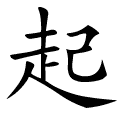起
- to rise;
- to get up;
- to stand;
Etymology
A phono-semantic/associative compound:
走 (“to walk, to move”) — semantic element, indicating movement or action
巳 (phonetic component, originally depicting a curled form) — provides sound value
Together, they convey the sense of “to begin to move, to rise up.”
Originally used for standing up or setting something in motion; extended to mean “to raise, to cause, to arise, to begin.”
Usage in Korean
起立 (기립) — to stand up
起床 (기상) — to get out of bed
起動 (기동) — to activate, to set in motion
起始 (기시) — beginning, start
起源 (기원) — origin, source
奮起 (분기) — to rise up with spirit, to rouse oneself
Additional notes
In classical texts, 起 often signifies the start of action or the arising of events, both physical (standing, rising) and abstract (causes, origins).
In Buddhist and Confucian writings, it can denote the arising of thoughts or intentions.
In modern usage, 起 commonly appears in compounds for “starting” or “activating.”
Alternative forms
𛀪
Words that derived from 起
- 土人口山 (GORU)
- 土人尸山 (GOSU)
- ⿺ 走 巳 (H T)
- ⿺ 走 己 (G J K V)
